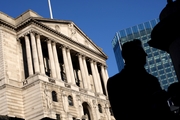 Today ‘s Bank of England meeting should herald the start of the somewhat mystical practice known as “Quantitative Easing”. This prospect of printing money has prompted panicked headlines about Zimbabwean- style inflation. But the process itself does not necessarily spell disaster.
Today ‘s Bank of England meeting should herald the start of the somewhat mystical practice known as “Quantitative Easing”. This prospect of printing money has prompted panicked headlines about Zimbabwean- style inflation. But the process itself does not necessarily spell disaster.
Normally the Bank manages inflation and activity indirectly, through interest rates. Lower rates encourage more spending and less saving, and higher inflation.
But in the current environment, even near zero interest rates are not enough to fight deflation, so unorthodox measures are needed. The Bank of England is going to try and increase the supply of credit directly, by buying up corporate bonds from financial institutions. To cut a long story short, this allows the banks to lend more (because they have more free cash), and reduces the cost of borrowing for business.
In principle, such Quantitative Easing is perfectly reasonable. Central banks all over the world are thinking about doing the same thing. But the Bank needs to give us a really clear sense of its strategy.
Consider this scenario: Quantitative Easing has the desired inflationary effect, at which point the Bank of England starts selling many of the bonds that it has bought. The private sector must step in as buyers. This means that all Quantitative Easing does is delay the need for the private sector to buy Government debt, raising the spectre once again of a Gilt strike, where the excess supply of Gilts might not find willing buyers. Furthermore if the market perceives that the Government won’t tolerate an inflation spike or indeed a default, it’s likely that as soon as Quantitative Easing starts working, it promptly has to be reversed; this could choke off any nascent recovery.
Quantitative Easing should buy the Government time, to keep the cogs turning in the hope of confidence returning to the economy. But if we set off down the Quantitative Easing route with without a clear roadmap, we risk destabilising the economy further.
Helen Thomas is a Research Fellow in Policy Exchange’s Economics Unit.






Comments